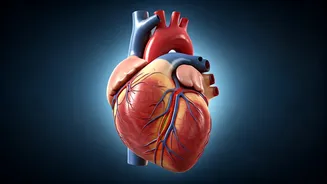Dangerous Everyday Habits
According to a heart surgeon, certain common daily habits can be surprisingly dangerous to your heart. These behaviors, often overlooked, can silently
contribute to heart problems. The surgeon highlights five specific habits that warrant attention. These habits aren't just about what you eat; they encompass various lifestyle choices that can impact your heart health. This information is crucial for understanding how seemingly small actions can significantly affect your cardiovascular well-being. Recognizing these habits is the first step toward making informed choices for a healthier heart. The advice provided emphasizes the importance of a proactive approach to heart health, urging people to be mindful of their daily routines.
Skipping Oral Hygiene
One of the most surprising habits identified is skipping teeth brushing, particularly at night. The surgeon explains that poor oral hygiene can lead to gum disease, which in turn increases the risk of heart disease. Bacteria from infected gums can enter the bloodstream and cause inflammation in the heart and blood vessels. This inflammation can contribute to the development of atherosclerosis, where plaque builds up in the arteries, potentially leading to heart attacks and strokes. The recommendation is straightforward: maintain a consistent oral hygiene routine, which includes brushing twice a day. This simple act can have a significant impact on overall heart health, underscoring the interconnectedness of different bodily systems.
Excessive Alcohol Consumption
Another dangerous habit highlighted is excessive alcohol consumption. While moderate drinking might be acceptable for some, heavy alcohol intake can severely damage the heart. Excessive alcohol can lead to high blood pressure, irregular heart rhythms (arrhythmias), and cardiomyopathy, a condition where the heart muscle becomes weakened and enlarged. These conditions can diminish the heart's ability to pump blood efficiently, leading to heart failure or stroke. The surgeon advises limiting alcohol consumption or abstaining altogether to protect heart health. This underscores the need for moderation and awareness when it comes to alcohol intake. The long-term effects of alcohol on the cardiovascular system should not be underestimated.
Sedentary Lifestyle
A sedentary lifestyle, characterized by prolonged periods of sitting and lack of physical activity, is another significant risk factor. Lack of exercise contributes to obesity, high cholesterol, and high blood pressure, all of which strain the heart. Regular physical activity, on the other hand, strengthens the heart muscle, improves blood circulation, and helps maintain a healthy weight. The surgeon recommends incorporating at least 30 minutes of moderate-intensity exercise, such as brisk walking or cycling, most days of the week. This recommendation emphasizes the importance of movement in promoting heart health. Finding enjoyable forms of exercise makes it easier to stay active and protect your cardiovascular system.
Unhealthy Diet Choices
The surgeon also addresses poor dietary choices as a major contributor to heart problems. Diets high in saturated and trans fats, processed foods, and added sugars can increase cholesterol levels and promote plaque buildup in arteries. This increases the risk of heart disease. Conversely, diets rich in fruits, vegetables, whole grains, and lean proteins are beneficial for heart health. The advice is to focus on a balanced diet, limiting unhealthy fats and processed foods, and increasing the intake of heart-healthy foods. This highlights the vital role of nutrition in maintaining a healthy cardiovascular system. Small, consistent changes in dietary habits can yield significant long-term benefits for heart health.
Ignoring Stress
Finally, the surgeon emphasizes the impact of chronic stress on heart health. Prolonged stress elevates blood pressure and releases hormones that can damage blood vessels. Unmanaged stress can also lead to unhealthy coping mechanisms, such as overeating or smoking, which further compromise heart health. The recommendation is to find healthy ways to manage stress, such as exercise, meditation, or spending time in nature. This underscores the importance of mental and emotional well-being in maintaining a healthy heart. Stress management is not just about feeling better; it's a critical component of heart health, encouraging a holistic approach to wellness.




















